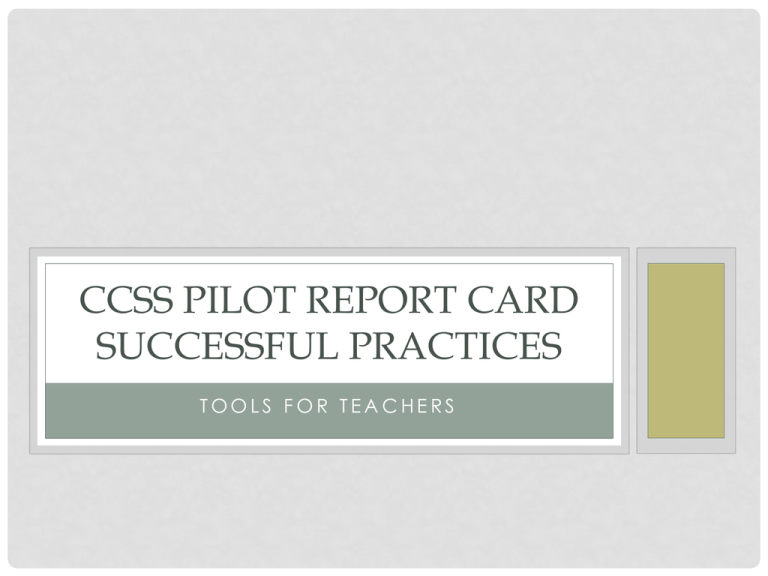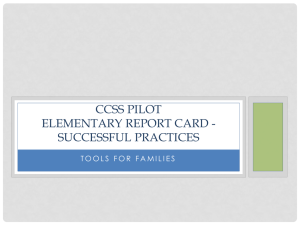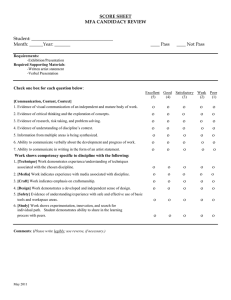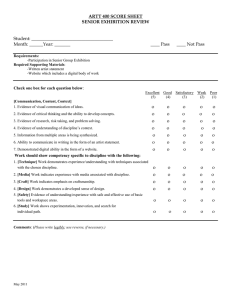CCSS PILOT REPORT CARD SUCCESSFUL PRACTICES
advertisement

CCSS PILOT REPORT CARD SUCCESSFUL PRACTICES TOOLS FOR TEACHERS WHEN DO I START MARKING? • Trimester 1: Provide instruction for students and information/tips for parents • Trimester: Include marks on the report card for the two “Demonstrates Self Discipline” areas. • Trimester 2: Begin observation and data collection • Trimesters 2 & 3: Include marks on the report card in all 7 areas. WHAT ARE THE PRACTICES? • • • • • • • Demonstrates grit/perseverance Exhibits a growth mindset Demonstrate gratitude Demonstrates curiosity Constructively Collaborates Demonstrates Self Discipline – Interpersonal Demonstrates Self Discipline – Class Work & Homework GRIT • Tries hard even after experiencing failure • Stays committed to goals and projects (long term) • Keeps working hard even when s/he feels like giving up • Stays committed to work until it is completed CURIOSITY • Is excited to discover and explore new concepts or things • Asks questions that help him/her improve learning • Is interested in learning new things • Seeks to understand concepts GROWTH MINDSET • Believes effort is essential for success • Stays motivated, even when things are challenging • Believes that s/he can improve in areas that are difficult GRATITUDE • Is aware of what other people have done for him/her • Expresses appreciation (e.g. says “Thank you”) • Reciprocates by doing something nice for someone else CONSTRUCTIVELY COLLABORATES • Is able to find solutions when disagreements arise • Demonstrates that s/he cares about the feelings of others • Adapts to different groups and situations DEMONSTRATES SELF DISCIPLINE – CLASS WORK AND HOMEWORK • Comes to school/class prepared • Remembers and follows directions • Gets to work immediately • Stays focused and is able to resist distractions DEMONSTRATES SELF DISCIPLINE INTERPERSONAL • Remains calm even when provoked by others • Is courteous to adults and peers • Allows others to speak without interrupting MARKING SCALE WHAT DOES IT MEAN? • Almost Always: Very likely to exhibit this behavior • Often: Likely to exhibit this behavior • Sometimes: Less likely to exhibit this behavior • Rarely: Not likely to exhibit this behavior WHAT DOES THIS MEAN FOR SPECIAL STUDENT POPULATIONS? English Language Learners and Refugees • Consider students’ unique EL language and cultural customs. • Consider consulting with an English Learner Instructional Specialist (ELIS). • Take into consideration any traumatic incidents in the child’s life. • Measure the student against him/herself, not the rest of the class. WHAT DOES THIS MEAN FOR SPECIAL STUDENT POPULATIONS? Students with Special Needs (Special Education) • Consider students’ special education eligibility (autism, speech, OHI, SLD, etc.) • Consider any related IEP goal areas for the student. • Consult with the student’s case manager. • Measure the student against him/herself, not the rest of the class. TALKING POINTS TO SUPPORT PARENT/TEACHER CONFERENCES • “This is a snapshot at this point in time at school; it is not a comprehensive judgment.” • Be able to point to and talk about activities or lessons where you have observed the indicators (science groups, recess, literacy block, etc.). • Use language around the scale to describe your markings (very likely, less likely, etc. on slide 11). TIME TO PROCESS AND COLLABORATE With a colleague or grade level team, dialogue about the following: • What structures are already in place in your classroom to assist you in observing and collecting data to measure growth with the Successful Practices? • What information or tips do you need to communicate with your parents about the Successful Practices work in your classroom? • How can we align our efforts as a grade level or as a school team? RESOURCES Online Resources www.schoology.com Log on using your PIN and Password for San Juan USD “The Key to Success: Grit” by Angela Duckworth http://www.ted.com/talks/angela_lee_duckworth_the_ke y_to_success_grit?language=en# Books • How Children Succeed, by Paul Tough • Choice Words, by Peter Johnston • Opening Minds, by Peter Johnston • Mindset, by Carol Dweck


